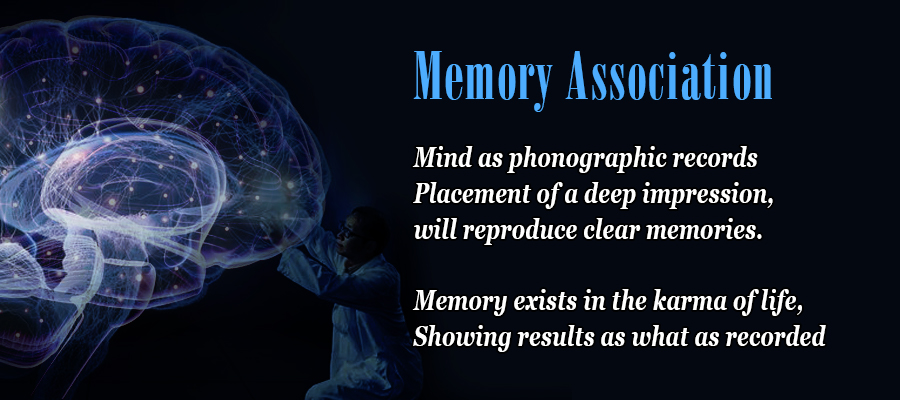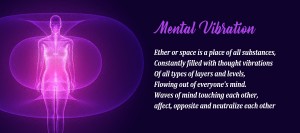Memory means an accumulated past. Memory means information. Memory means that which does not exist but acts out as if it does. Memories are more real than reality.
It was formerly held that the memory retained only a portion of the impressions and experiences originally noted by it. It is true that many of these impressions are never reproduced in consciousness, but experiments tend to prove, nevertheless, that the records are still in the memory and that appropriate and sufficiently strong stimuli will bring them into the field of consciousness.
The phenomena of somnambulism, dreams, hysteria, delirium, approach of death, etc., show that the subconscious mind has an immense accumulation of apparently forgotten facts, which unusual stimuli will serve to recall.
The power of the memory to reproduce the retained impressions and experiences is variously called remembrance, recollection, or memory. This power varies materially in various individuals, but it is an axiom of psychology that the memory of any person may be developed and trained by practice.
The ability to recall depends to a great extent upon the clearness and depth of the original impression, which in turn depends upon the degree of attention given to it at the time of its occurrence. Recollection is also greatly aided by the law of association, or the principle whereby one mental fact is linked to another.
The more facts to which a given fact is linked, the greater the ease by which it is recalled or remembered.
The recognition of the recalled impression is quite important. It is not enough that the impression be retained and recalled. If we are not able to recognize the recalled impression as having been experienced before, the recollection will be of but little use to us in our thought processes; the purposes of thought demand that we shall be able to identify the recalled impression with the original one. Recognition is really recognition reknowing. Recognition is akin to perception. The mind becomes conscious of the recalled impression just as it becomes conscious of the sensation. It then recognizes the relation of the recalled impression to the original one just as it realizes the relation of the sensation to its object.
The localization of the recalled and recognized impression is also important. Even if we recognize the recalled impression, it will be of comparatively little use to us unless we are able to locate it as having happened yesterday or at some time in the past.
Without the power of localization we should be unable to connect and associate the remembered fact with the time, place, and persons with which it should be placed to be of use and value to us in our thought processes.
Retention Memory in mind
The retention of a mental impression in the memory depends very materially upon the clearness and depth of the original impression. Attention is the important factor in the forming and recording of impressions.
In this connection we should remember that attention depends largely upon interest. Therefore we would naturally expect to find that we remember interesting things far more readily than those which lack interest.
The moral is Arouse and induce an interest in the things which you wish to remember.
Mind Visualization in Memory
Many of the best authorities hold that original impressions may be made clear and deep, and the process of reproduction accordingly rendered more efficient, by the practice of visualizing the thing to be remembered.
Visualizing is meant the formation of a mental image of the thing in the imagination. If you wish to remember the appearance of anything, look at it closely, with attention, and then turning away from it endeavor to reproduce its appearance as a mental picture in the mind.
If this is done, a particularly clear impression will be made in the memory, and when you recall the thing you will find that you will also recall the clear mental image of it. Of course the greater the number of details observed and included in the original mental image, the greater the remembered detail.
Mind Perception in Memory
Not only is attention necessary in forming clear memory records, but careful perception is also important. Without clear perception there is a lack of detail in the retained record, and the element of association is lacking.
It is not enough to merely remember the thing itself; we should also remember what it is, and all about it. The practice of the methods of developing perception, given in a preceding lesson, will tend to develop and train the retentive, reproductive, recognitive, and locative powers of the memory.
The greater the degree of perception accorded a thing, the greater the detail of the retained impression, and the greater the ease of the recollection.
Understanding Memory
Another important point in acquiring mind impressions in memory is that the better the understanding of the subject or object, the clearer the impressions regarding it, and the clearer the recollection of it.
It is very difficult to remember a meaningless string of words, while a sentence which conveys a clear meaning may be memorized easily. If we understand what a thing is for, its uses and employment, we remember it far more easily than if we lack this understanding.
The subject of memory cannot be touched upon intelligently without a consideration of the Law of Association, one of the important psychological principles.
The Law of Association Memory
What is known in psychology as the Law of Association is based on the fact that no idea exists in the mind except in association with other ideas. This is not generally recognized, and the majority of persons will dispute the law at first thought. But the existence and appearance of ideas in the mind are governed by a mental law as invariable and constant as the physical law of gravitation. Every idea has associations with other ideas.
Often we fail to trace the associations governing our ideas, but the chain is there nevertheless. One may think of a past scene or experience without any apparent cause. A little thought will show that something seen, or a few notes of a song floating to the ears, or the fragrance of a flower, has supplied the connecting link between the past and the present.
A suggestion of mignonette will recall some past event in which the perfume played a part; some one’s handkerchief, perhaps, carried the same odor. Or an old familiar tune reminds one of some one, something, or some place in the past.
Often the starting idea, or the connecting links, may appear but dimly in consciousness; but rest assured they are always there. In fact, we frequently accept this law, unconsciously and without realizing its actual existence. For instance, one makes a remark, and at once we wonder, “How did he come to think of that?” and, if we are shrewd, we may discover what was in his mind before he spoke.
There are two general classes of association of ideas in memory, viz.: (1) Association of contiguity, and (2) logical association.
Association of contiguity is that form of association depending upon the previous association in time or space of ideas which have been impressed on the mind. For instance, if you met Mr. and Mrs. W and were introduced to them one after the other, thereafter you will naturally remember Mr. W. when you think of Mrs. W., and vice versa. Likewise, you will think of abstract time when you think of abstract space, of thunder when you think of lightning.
In the same way we remember things which occurred just before or just after the event in our mind at the moment; of things near in space to the thing of which we are thinking.
Logical association depends upon the relation of likeness or difference between several things thought of. Things thus associated may have never come into the mind at the same previous time, nor are they necessarily connected in time and space.
One may think of a book, and then proceed by association to think of another book by the same author, or of another author treating of the same subject. Or he may think of a book directly opposed to the first, the relation of distinct difference causing the associated idea.
Logical association depends upon inner relations, and not upon the outer relations of time and space.
This innerness of relation between things not connected in space or time is discovered only by experience and education. Wisdom and knowledge consist largely in the recognition of relations between things.
Repetition of Mind in Memory
Another important principle of memory is that the impressions acquire depth and clearness by repetition.
Constant repetition deepens memory impressions; frequent reviewing and recalling what has been memorized tends to keep the records clear and clean, beside deepening the impression at each review
Placement of a good impression, clear and deep, it will reproduce good, clear, and strong memories.
Think of memory as a phonographic record and be careful to place the right type of memory in our minds. In memory we will reap what we have sown before (Karma).
We must give sprinkles to memory before we can receive from it. Memory requires attraction before it is interested in the task of remembering it. That requires prior attention and understanding. This requires the association before it will respond to the association. It requires repetition before it will be repeated.
Memory and Karma
Karma is not just about something good or bad that you did. Karma is the memory of life. The very way the body is structured is because there is memory of life right from that celled to every other form.
If acts were inscribed in the ether-body, as are the remembered thoughts, life would be made impossible for earthly man. Just as the ether-body is the instrument for the thoughts, in so far as they become remembrances and memories, so is the astral body the instrument for deeds. Deeds proceed from the astral body.
Everyday consciousness is bound up with the physical body; remembrances and memory with the ether-body; delicate and rarified though the astral body is every action, remaining as it does as an influence in the outer world, has its source in the astral body.
The consequence of this is that actions remain in a certain sense bound up with the astral body just as mind memory remains in ether-body.
The memories of the life that is just over remain in the ether-body. When the ether-body has been laid aside after death and all that has been preserved in the form of personal memories has been inscribed into the universal life-ether.
In the astral body he in for a long time, bound up with the outer effects caused during his life.
And just as the personal memories are inscribed into the universal life-ether when the ether-body is laid aside a few days after death, so in the period during which the human being is bound up with the astral body, all his deeds are inscribed into the all-pervading cosmic astrality.
They are within the cosmic astrality and he remains connected with them memory, just as he is connected with his personal memories which have been recorded as an abiding inscription in the cosmic ether only his deeds are inscribed as it were into a different cosmic register.
While the human being is living backwards through the deeds and acts performed in the past life, they are all inscribed in the cosmic astrality and he remains connected with them. Through his astral body, therefore, the earthly man remains connected with his deeds.
Deeds performed during life are inscribed in memory, after death move into the cosmic astrality.
The Ego “ I ” passes from incarnation to incarnation, is within us while we are unfolding our earthly consciousness, while we are preserving picture after picture in our memory and while we are accumulating karma from one incarnation to another.
In reality it is the astral body which causes karma to remain. But the “ I ” is a spiritual potency, a spiritual being. What the “ I ” creates, as the astral body creates karma, does not remain connected with man but detaches itself from him as forms created by thoughts.
Whereas what is inscribed in his karma remains connected with him and is instilled into subsequent phases of Earth-evolution, something else of a very definite character is brought into existence by the human “ I,” and passes over into other worlds as memories pass over into the cosmic life-ether.
Just as karma is inscribed in the cosmic astrality, so the God creations of the “ I ” the forms created by thoughts and feelings. Karma remains connected with the human being, but the pure of soul “ I ” is detach themselves from karma, to begin and live on as spiritual forms in the human body.





